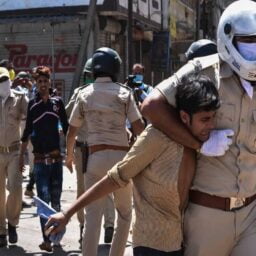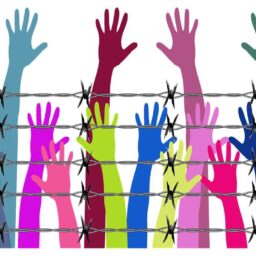THE PROTEST AND THE BLAME GAME
The Cuban protestors are calling for Freedom and expressing opposition to the elected President Miguel Diaz Canel. This is the massive Anti-government protests Cuba has ever experienced, starting from the streets of Havana to Santiago. People were infuriated as a result of non-provision of basic needs (food, medicine and electricity) and were seen shouting “Step out Diaz canel”.
While all this was happening, the Cuban government asserts that the depleting financial condition of the country is due to the provocation of the United States. The dependency of Cuba on other countries for food and other resources made it more difficult for the country to provide as the United States put an official ban on trade and commerce.
The country also put allegations on the US for capitalizing the protests, by taking it to social media. Moreover, it was concluded that the long term policy of the US to seize Cuba is liable and also, they are using the people of Cuba for the same purpose. The United States on the other hand braced people protesting for their rights and requested the Cuban government to allow people to protest unwarlike.
THE PEOPLE, THE RESENTMENT AND THE RATIONALE
The protest took place due to non-fulfilment of basic rights, food and medicine. Cuba’s dependency on other countries became a challenge after pandemic began. The food supply was short and medicines were not available even to those who were distressed.
The biggest failure was pandemic management. Inadequacy of masks and vaccines made people more agitated at such difficult times. Due to such negligence, many people lost their lives and the government did not even acknowledge the same. The decline of the economy and the increasing poverty with the Job crisis resulted in poor standard of living, due to which the people resented the government and their policies.
THE CUBAN ECONOMY
As Cuba is an import dependent country and the economy of any country is highly dependent on the imports and exports they make. The imports of Cuba declined by 40% in past 18 months and the economy depleted to 10.8% in the year 2020. There was also a decline of 2% in the first half of 2021.
The history of Cuba
Fidel Castro, the leader of the armed revolution, took over the government of Fulgencio Batista on the first of January in the year 1959. He ruled Cuba from 1959 to 2008.
The Spanish-American war broke out in the year of 1902 and The United States took control over Cuba. Until then Cuba was a Spanish colony. Cuba’s own constitution was enacted via a special conference after signing the Platt agreement. The US was a major trading partner of Cuba and also, its intervention made Cuba a developing country. There was peace and prosperity until 1919 due to the growing export of expensive sugar.
During World War I, The US had Cuba’s allegiance and a war was declared on Germany. Due to which the financial crisis was uprooting in almost every county and it had a worse impact on Cuba as well. As the price of sugar fell below the expected margin, Cuba’s economy was devastated. The then leader Alfredo Zayas y Alfonso (1921-1925) took a loan of $50 million from the US and fled, thereafter, due to the financial crisis.
From 1925 to 1933, Gerardo Machado y Morales ruled as a Dictator and established Martial laws. The practice of any kind of freedom was prohibited. He made many attempts to stabilize the economy and hold his office but failed each time. Finally, In the year 1933 he withdrew from the office. Thereafter, Fulgencio Batista y Zaldívar assumed the office. He also had dictatorial approach and powers which he used to crush the continual rebellion turning up during his term. He led Cuba during World war II and as it ended, political ties were established with The Soviet union. Zalvidar was re-elected in 1952, he made a great attempt to stay in power for a longer period even when he was failing to make any reforms. Also, the rebellion grew against him. He was taken over by Fidel Castro after the battle with Batista’s army.
Fidel Castro came up as a conquering hero after battling with Batista’s army. He also undertook the same strategy to stay in power. He denied further elections and decided to exercise dictatorship as well. He detained and executed his rivals and supporters of Batista cold blooded. When the US entered into dog-eat-dog war with the Soviet Union, Fidel refused to support the former. Lack of arms and men were the grounds to defend the non-participation. Thereafter, all ties of Cuba with the US were severed. Also, the US imposed trade restrictions on Cuba. Fidel remained in power till 2008 and after his resignation during the financial crisis, he handed over to his brother.
THE CUBAN GOVERNMENT AND HUMAN RIGHTS
As per the reports, more or less sixty people were prosecuted while protesting. Although the charges were minor, the people detained were not released even after many complaints by the relatives and loved ones. Out of 1000 people, who participated in the protest, nearly 100 people were detained and many of them were prosecuted for public disorder, vandalism and propagation of coronavirus pandemic. Activists recorded at least 600 names of people who were arrested amid the protest. Few supranational organisations like European Union’s foreign relations Chief, Joseph Borell Stated that “The Cubans have the right of their resentment against the government but peacefully.”
The United nations’ human rights chief called on Cuba to release the arrested protestors and journalists.
CONCLUSION
The Cuban protests resulted from the infringement of basic rights of life. The Cuban government and their audacity to inflict violence against the protestors shows the avariciousness of dictatorial powers and doing things as they like. The ill treatment of its people shows the wicked character of the government which shall be replaced immediately. Cuba deserves democracy, not dictatorship. So that human rights are protected and people are served for the country to develop and flourish.
Author(s) Name: Deepika Budhalakoti (Miranda House, Delhi University)






